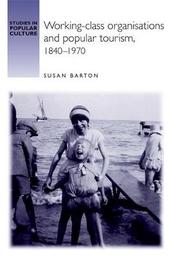
|
Working-Class Organisations and Popular Tourism, 1840-1970
Hardback
Main Details
| Title |
Working-Class Organisations and Popular Tourism, 1840-1970
|
| Authors and Contributors |
By (author) Susan Barton
|
| Series | Studies in Popular Culture |
|---|
| Physical Properties |
| Format:Hardback | | Pages:256 | | Dimensions(mm): Height 234,Width 156 |
|
| Category/Genre | Tourism industry |
|---|
| ISBN/Barcode |
9780719065903
|
| Classifications | Dewey:306.41820942 |
|---|
| Audience | |
|---|
| Illustrations |
Illustrations, black & white
|
|
Publishing Details |
| Publisher |
Manchester University Press
|
| Imprint |
Manchester University Press
|
| Publication Date |
24 March 2005 |
| Publication Country |
United Kingdom
|
Description
Today, many people take the idea of holidays for granted and regard the provision of paid time off as a right. This book argues that popular tourism has its roots in collective organisation and charts the development of the working class holiday over two centuries. Starting with the cult of St. Monday, the problem of absenteeism of northern textile workers during Wakes Week, and culminating in the cheap foreign package holiday of the late 20th century, this study recounts how short, unpaid and often unauthorised periods of leave from work became organised and legitimised through legislation, culminating with the Holidays with Pay Act of 1938. Moreover, this study finds that it was through collective activity by workers - through savings clubs, friendly societies and union activity - that the working class were originally able to take holidays, and it was as a result of collective bargaining and campaigning that paid holidays were eventually secured for all. This fascinating study will be of use to students and scholars of social history, travel and tourism and labour studies. -- .
Author Biography
Susan Barton studied for her PhD at de Montfort University in Leicester and now researches in the field of social history, particularly the history of tourism
Reviews"'Barton's study of tourism fills a niche that so far has been little examined' John Lowerson, Sussex University"
|